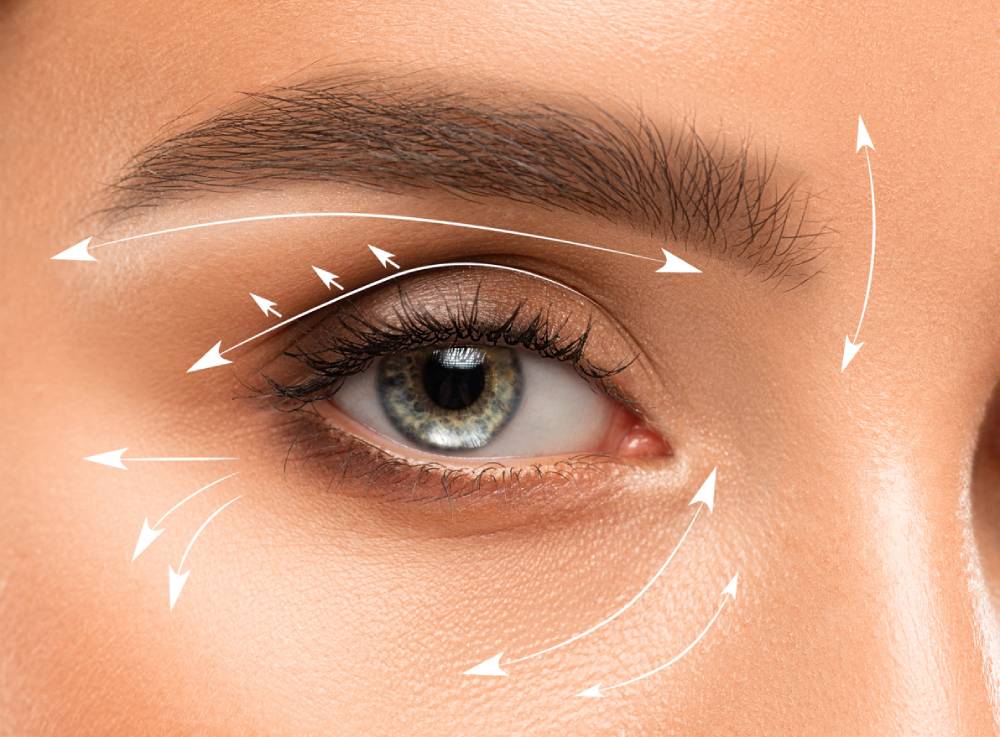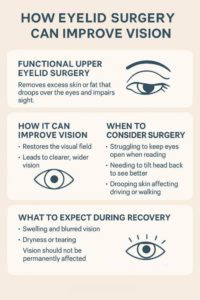For many, upper eyelid surgery (also known as blepharoplasty) is about more than just enhancing appearance—it’s about restoring function. Sagging eyelids can obstruct your line of sight, making it harder to enjoy everyday activities like reading, driving, or even seeing clearly. For others, the motivation may be purely aesthetic, with concerns about how the surgery could impact their vision.
So, when it comes to the question, “Will eyelid surgery affect my vision?”—the answer is a bit of both. With the right expertise and approach, eyelid surgery can actually improve your vision by lifting sagging lids. However, as with any surgery, you must choose a qualified oculoplastic surgeon who understands your needs and can ensure a safe, effective procedure with results that look and feel natural.
Will Eyelid Surgery Affect My Vision?
When performed by an experienced upper eyelid surgery specialist, eyelid surgery will not negatively affect your vision. In fact, in many cases, it can be improved.
Functional upper eyelid surgery removes excess skin or fat that droops over the eyes, thereby improving vision. Patients often report clearer and wider vision after recovery. However, as with any surgical procedure, a short recovery period may be required, during which temporary swelling or blurriness may occur. Know that these effects are normal and resolve as healing progresses.
How Eyelid Surgery Can Actually Improve Vision
If you’re someone whose upper eyelids have begun to sag significantly due to age, genetics, or medical conditions, you have probably already experienced how the skin can droop low enough to partially block the upper field of vision. This condition, known as dermatochalasis, is not only frustrating but also potentially hazardous, particularly when driving or navigating unfamiliar environments.
Luckily, by removing excess tissue and tightening the area, upper eyelid surgery performed by a skilled oculoplastic surgeon can restore your visual field, leading to improved peripheral vision and a better quality of life. Many patients also report that their eyes feel less strained and fatigued after the procedure, especially at the end of a long day.
When to Consider Eyelid Surgery for Vision Reasons
If you’re experiencing any of the following, eyelid surgery may be more than a cosmetic choice but rather a functional necessity:
- Struggling to keep your eyes open when reading
- Needing to tilt your head back to see better
- Noticing drooping skin interfering with driving or walking
- Experiencing chronic eye fatigue
- Frequent tension headaches from squinting
During your consultation at EPSoM, your oculoplastic surgeon can perform a visual field test to determine if your upper eyelids are obstructing your vision. If they are, insurance may even cover the procedure when documented as medically necessary.
What to Expect Visually During Recovery
While long-term results are overwhelmingly positive, it’s helpful to know what to expect in the days and weeks following eyelid surgery. Here’s some of what you might experience:
Swelling and Blurred Vision
Mild swelling and bruising are typical after upper eyelid surgery and can temporarily affect how clearly you see. This may be accompanied by some light sensitivity or eye irritation.
Dryness or Tearing
It’s also common to experience either dry eyes or excessive tearing during the early recovery phase. Your oculoplastic surgeon may recommend artificial tears or lubricating ointment to keep your eyes comfortable.
Vision Should Not Be Permanently Affected
Any visual changes that occur during the healing period should be temporary. If anything feels unusual beyond the expected recovery timeline, your surgical team at EPSoM will be available to monitor your progress and address any concerns you may have.
How an Oculoplastic Surgeon Minimizes Vision Risk
One of the most important decisions you’ll make when considering eyelid surgery is choosing the right provider. An oculoplastic surgeon is a medical doctor who is fellowship-trained in both ophthalmology and plastic surgery of the eyes and surrounding structures.
This specialized training allows them to approach your procedure with a deep understanding of both function and aesthetics. They don’t just see the eyelid as a surface to sculpt—they understand how every change could affect tear flow, blinking, lid position, and ultimately, your vision.
Is There a Risk of Overcorrection?
A common concern with any facial procedure is the fear of looking unnatural or experiencing functional issues, such as dry eyes or difficulty closing the eyelids completely.
Overcorrection—removing too much skin or tissue—can contribute to these outcomes. That’s why experience matters. A conservative, skillful approach guided by detailed pre-surgical measurements and a nuanced understanding of facial anatomy is essential.
An experienced upper eyelid surgery specialist will balance aesthetics with functionality, ensuring you look refreshed but not “done” and feel better without sacrificing comfort.
Take the First Step Toward Clearer Vision and a Refreshed Look
If you’ve been wondering whether eyelid surgery will affect your vision, the answer is yes—in the best way possible. Schedule a consultation with EPSoM today to learn how upper eyelid surgery with an upper eyelid surgery specialist can restore both your sight and your confidence.


